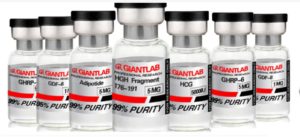GHK-CU, (Copper Peptide) is a naturally occurring human tri-peptide. In plasma, the level of GHK-Cu is about 200 ng/ml at age 20. By the age of 60, the level drops to 80 ng/ml. Scientific studies conducted in different research laboratories around the world have established that human tri-peptide GHK-Cu possesses a plethora of biological actions including activation of wound healing, attraction of immune cells, antioxidant and anti-inflammatory effects, stimulation of collagen and glycosaminoglycan synthesis in skin fibroblasts and promotion of blood vessels growth. Recent studies indicate its important role in stem cell biology and anti-tumor defense. Since GHK-Cu plays an important role in skin biology, it is widely used in cosmetics as a reparative and anti-aging ingredient. The levels of GHK decrease as you age.
Recently, GHK-Cu has been gaining publicity as a prospective therapeutic agent for chronic obstructive pulmonary disease (COPD), skin inflammation, and metastatic colon cancer. It has been established that it is capable of up- and downregulating at least 4,000 genes in the human genome, essentially resetting DNA back to a healthier state. These studies shed new light on the skin remodeling activity of the GHK-Cu peptide.
Clinical Trials and Studies:
In 1994, doctors discovered that the application of a 2% GHK-Cu gel on diabetic patients was enough to enhance the percentage of ulcer closure from 60.8% to 98.5% and decrease the percentage of infections from 34% to 7%. Numerous controlled facial studies confirm that Copper Peptide is an essential element that can be used to firm and tone skin, likewise, reduce wrinkles and the facial aging process. Doctors found that GHK-Cu amplified collagen in the photoaged skin and demonstrated remarkable improvements in skin laxity, clarity, and overall appearance.
Further clinical studies highlight the efficiency of synthetic analog found in Copper Peptide used to stimulate hair growth. Researchers believe that the presence of Copper Peptide in the body can stimulate the proliferation of keratinocytes and increase the expression of integrins and P63 protein in the epidermal stem cell resulting in its ability to revive proliferative prospects of epidermal stem cells and heighten their ability to repair tissue within the body.
Cosmetic use:
Copper peptide GHK-Cu is widely used in anti-aging cosmetics (INCI name: Copper tripeptide-1).Several controlled facial studies confirmed anti-aging, firming and anti-wrinkle activity of copper peptide GHK-Cu. Abdulghani et al. established that facial cream containing GHK-Cu increased collagen in photoaged skin of 20 female volunteers, performing better than vitamin C and retinoic acid. Leyden et al. conducted 12 weeks facial study of GHK-Cu containing face and eye cream, reporting significant improvement of skin laxity, clarity and appearance, reduced fine lines and the depths of wrinkles and increased skin density and thickness comparing to placebo. GHK-Cu eye cream performed better than vitamin K cream. Finkley et al. conducted 12 week facial study on 67 women and reported that GHK-Cu cream applied twice daily improved aged skin appearance, increased thickness, reduced wrinkles and strongly stimulated dermal keratinocyte proliferation as determined by histological analysis of biopsies. The same study found copper peptide GHK-Cu to be non-toxic and non-irritating.
Conclusion:
Copper Peptide GHK-Cu has been studied by doctors and researchers worldwide for over 40 years. It’s biological effects have been proven through research studies and clinical trials on humans, as well as lab rats. GHK-Cu is naturally produced by the human body and is safe to administer as a serum or microneedle treatment. It’s antioxidant and anti-inflammatory effects, as well as, its ability to amplify collagen, elastin and glycosaminoglycan synthesis, repair tissue and regulate human genes makes it a prominent medical breakthrough.


This Post Has One Comment
Reed Clippard
27 Sep 2020I am not sure where you’re getting your info, but great topic. I needs to spend some time learning more or understanding more. Thanks for great info I was looking for this info for my mission.